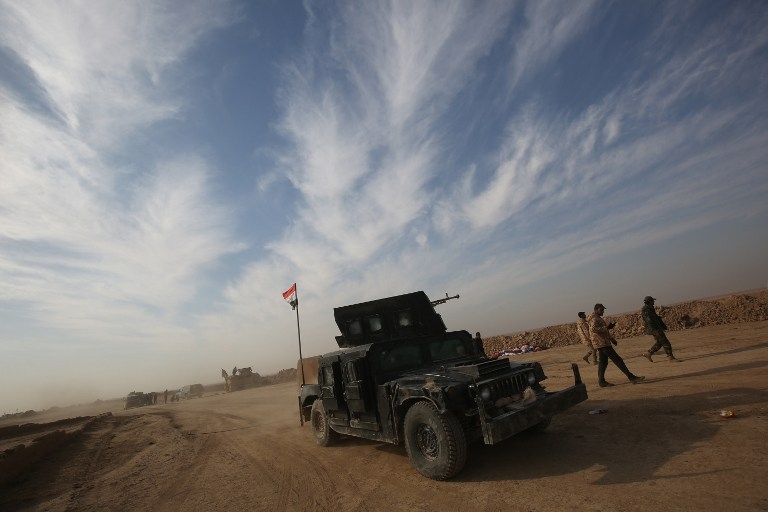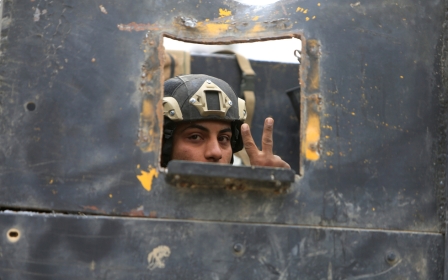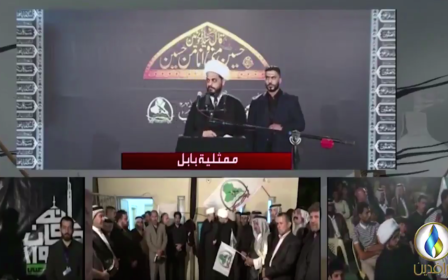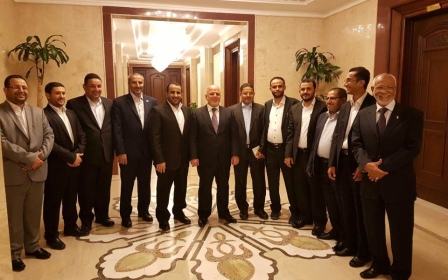Unleashing the untameable monster: Iraqi bill will only inflame sectarianism

The passing of a bill by Iraq’s parliament on Saturday legalising the Popular Mobilisation Units (PMUs) as a government entity operating alongside the army will further exacerbate sectarian tensions by cementing the political and military influence of this alliance of largely Shia militias, as well as that of Iran, which backs most of them. Sectarian divisions were plain to see in the parliamentary vote – all the Shia blocs approved the measure, while Sunni MPs boycotted the session.
Iraq risks becoming another Libya, run by militias with competing agendas, interests and loyalties, and with a sense of entitlement and impunity due to their military contributions in defeating IS
Some analysts are portraying the bill as an attempt to rein in the PMUs, which number more than 100,000 fighters, and whose power has continued to grow since their formation from existing militias in 2014 to fight the Islamic State (IS). However, the Shia parliamentary blocs and Prime Minister Haidar al-Abadi – to whom the PMUs will now answer – have thus far said and done little, if anything, to suggest a genuine desire to do so.
This is particularly unlikely now, with the PMUs playing a key role in the operation to retake Mosul from IS. On the contrary, the bill is likely an attempt to reward the militias for their service.
In whose interests?
For Abadi, this may be a means of consolidating his position against his political rivals, particularly his predecessor Nouri al-Maliki. Tensions between the two have been high, with Abadi attempting to abolish the vice-presidential posts (one of which is occupied by his predecessor), and Maliki trying to thwart the prime minister’s reform programme.
'The most influential [militia leaders] describe themselves as loyal not only to Iraq but also to Iran’s supreme leader, Ayatollah Ali Khamenei'
Now that the PMUs answer to Abadi directly, and since he is friendly with militia leaders, he may see this as a boost for his position. However, Maliki also has allies within the PMUs, and they may react with hostility to any attempts by Abadi to use them as pawns for his political gain. As such, the bill heralds even greater militia influence over the government, not the other way around.
It also consolidates Iranian influence. “The most influential [militia leaders] describe themselves as loyal not only to Iraq but also to Iran’s supreme leader, Ayatollah Ali Khamenei,” wrote Ned Parker, who had to flee Iraq as Baghdad bureau chief for Reuters last year after receiving death threats for his report on human rights abuses by Shia militias.
“Three big militias – [the] Badr Organisation, Asaib Ahl al-Haq and Kataib Hezbollah – use [Khamenei’s] image on either their posters or websites.”
Last year, Akram al-Kaabi, leader of the Harakat al-Nujaba militia, said he would overthrow the Iraqi government if Khamenei ordered him to do so. Clearly, a government dependent on and beholden to the PMUs is not going to antagonise them or their patron in Tehran.
Even harder to rein in
The bill will further embolden the militias, as it will boost their legitimacy, status and state support. This may make them even more brazen in their abuses against Sunni civilians in territories captured from IS. The list of atrocities continues to grow, and they are well-documented by human rights organisations.
It is hard to imagine the government reining in the militias when it has consistently dismissed allegations of their abuses, and when the army has carried out its own – sometimes alongside the PMUs – or watched without intervening
Amnesty International has said the militias “enjoy total impunity,” and “are ruthlessly targeting Sunni civilians on a sectarian basis,” committing “war crimes and other gross human rights abuses". Human Rights Watch has documented “mass extrajudicial killings” that “may be evidence of war crimes or crimes against humanity".
It is hard to imagine the government reining in the militias when it has consistently dismissed allegations of their abuses, and when the army has carried out its own – sometimes alongside the PMUs – or watched without intervening. “The Iraqi authorities have effectively granted [militias] free rein to go on the rampage against Sunnis,” said Amnesty.
The bill may end up being a headache for Abadi now that the militias are answerable to him, as he will bear responsibility for their actions. This is unlikely to affect support from key foreign backers such as Iran, Russia and the US, which have continued to back Baghdad despite state and militia abuses.
However, it will further heighten sectarian tensions in the country, as Sunni politicians and leaders have warned – something Abadi pledged to heal when he came to office.
One such politician, Khamis Khanjar – who financed the 3,000-strong Nineveh Guards Force – said on Tuesday that Iraq could split up and suffer the worst sectarian bloodshed since the 2003 US-led invasion if the PMUs enter Mosul.
Consequences beyond Iraq
The result of the bill will effectively be an officially recognised parallel army, one that has all too often acted as a law unto itself, which predominantly uses Shia flags rather than the national one, and which will answer to a different minister (the national army reports to the defence minister, though the position has been vacant since August). This goes against attempts to assert central authority over a country suffering societal and territorial fractures.
How will Abadi handle the PMUs’ stated ambitions beyond Iraq? In October, one of its spokesmen said it would fight alongside Syrian President Bashar al-Assad’s forces, and go to “any place that contains a threat to Iraqi national security,” after IS is defeated in Iraq. Also that month, Maliki said the campaign to liberate Mosul was a step toward operations in Syria and Yemen.
It is highly questionable whether Abadi has the power or desire to rein in the PMUs, within or beyond Iraq’s borders. Even if he wanted to, he may well choose not to act for fear that the militias would defy him and thereby undermine his authority, to the delight and benefit of his political opponents.
Iraq risks becoming another Libya, run by militias with competing agendas, interests and loyalties, and with a sense of entitlement and impunity due to their military contributions in defeating IS at the request of a weak government. Baghdad has unleashed a monster that it cannot tame, and this parliamentary bill will likely complicate any efforts to do so.
- Sharif Nashashibi is an award-winning journalist and analyst on Arab affairs. He is a regular contributor to Al Arabiya News, Al Jazeera English, The National, and The Middle East magazine. In 2008, he received an award from the International Media Council "for both facilitating and producing consistently balanced reporting" on the Middle East.
The views expressed in this article belong to the author and do not necessarily reflect the editorial policy of Middle East Eye.
Photo: Shia fighters from the PMUs advance in the village of Baylunah, southwest of Mosul, on 27 November 2016 during an ongoing operation against Islamic State (IS) (AFP).
This article is available in French on Middle East Eye edition.
New MEE newsletter: Jerusalem Dispatch
Sign up to get the latest insights and analysis on Israel-Palestine, alongside Turkey Unpacked and other MEE newsletters
Middle East Eye delivers independent and unrivalled coverage and analysis of the Middle East, North Africa and beyond. To learn more about republishing this content and the associated fees, please fill out this form. More about MEE can be found here.





